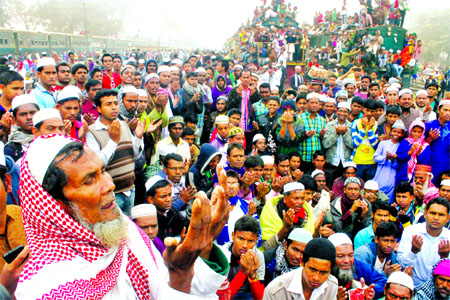
Joynal Abedin Khan:The first phase of Biswa Ijtema, the second largest Muslim congregation, concluded on Sunday with the Akheri Munajat (final prayers) seeking world peace and divine blessings for Muslim Ummah. The 35-minute long Munajat, started at 11:05am, was conducted by Indian eminent Islamic scholar Maulana Muhammad Saa’d.Some 30 to 35 lakh devotees, including 10,000 foreigners from over 100 countries, took part in the Akheri Munajat on the bank of the river Turag in Tongi, on the outskirts of the capital.The three-day Ijtema congregation was kicked off on Friday (January 8) after Fazr prayers with delivering special sermons (Aambayan) in the light of the Holy Quran and Hadith by veteran Islamic scholars from home and abroad. Their sermons were also available in several other languages for the participants. Islamic scholar of Tabligh Jamaat Abdul Matin interpreted the sermons into Bangla.President Abdul Hamid participated in the Munajat from his office at Bangabhaban in the city.Prime Minister Sheikh Hasina along with her younger sister Sheikh Rehana, Agriculture Minister Matia Chowdhury, Awami League joint secretary Dr Dipu Moni and other family members joined the Munajat from her official residence Ganabhaban.BNP Chairperson Khaleda Zia took part in the Munajat from her residence at Gulshan while Jatiya Party Chairman HM Ershad from Banani. Even members of different political parties, foreign dignitaries and government high-ups also took part in the Akheri Munajat.Meanwhile, three more devotees died on Sunday taking the toll to nine during the Ijtema. According to the civil surgeon office sources, nearly 5,000 devotees got treatment from 50 free medical camps. Most of them had been suffering from old-age problems. On the other hand, around 200 couples married without any dowry at the Ijtema venue. Such weddings are usually organised after the Asr prayers every year, said organizers.Besides, thousands of volunteers worked round the clock to make sure the event runs smoothly, they said.The organisers said that restrictions had been imposed on vehicular movement on some roads near the venue for easing the influx of devotees. Bangladesh Railways operated 28 special trains on different routes, including Akhaura, Comilla and Mymensingh so that people can go to the Ijtema venue to take part in the Akheri Munajat, Tongi Railway Station Master M Halimuzzaman said, “To make travelling easier for the Ijtema goers, special train services on different routes, including Akhaura, Comilla and Mymensingh were operated.”Bangladesh Road Transport Corporation (BRTC) also plied special buses on the occasion.The Tabligh Jamaat leaders this year did not give permission to broadcast the Akheri Munajat live and also barred taking photographs, a television journalist said. The plying of traffic was restricted till Sunday evening, said Gazipur’s Deputy Commissioner SM Alam.”Loudspeakers were set up along roads and alleys from the Ijtema ground to as far as the Hazrat Shahjalal International Airport, Tongi Railway Station and Tongi Station Road,” the DC said. Additional security measures were ahead of the Akheri Munajat. Around 12,000 members uniformed and plainclothes police, RAB and intelligence agencies were deployed in and around the Ijtema ground to avert any untoward situation.Gazipur Police Super Mohammad Harun Or Rashid said vehicular movement from Chandana intersection of Gazipur on Dhaka-Mymensingh highway to Airport, and from Savar-Bypile of Tongi-Ashulia road to Abdullahpur and Mirerbazar of Kaliganj-Tongi road was kept restricted RAB and police had also installed several observation towers and the whole Ijtema ground was monitored through CCTV cameras, the SP said. The second phase will start on 15 January and conclude on 17 January with the Akheri Munajat. For the first time, the Ijtema is being held in four phases in two years. People from 33 districts, including Dhaka, are taking part in the first two phases this year, while those from the remaining 31 districts and also Dhaka, will participate in the other two phases next year (2017).Tablighi Jamaat has been organising Bishwa Ijtema, also called the World Muslims’ Congregation, every year since 1946. However, the New Delhi-based Tabligh-e-Jamaat has been organising the Ijtema since 1967.In 2011, the organisers had split the congregation into two phases to deal with overcrowding and ensure better management and security.

